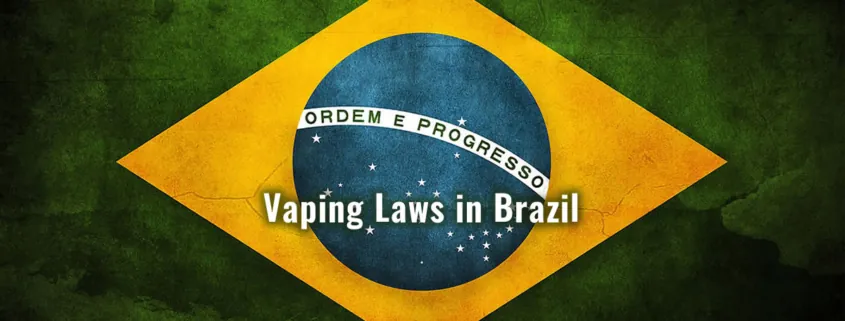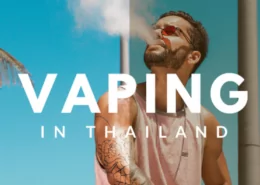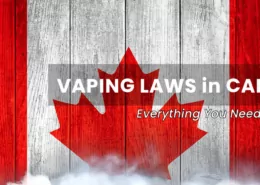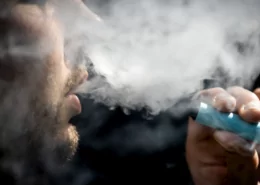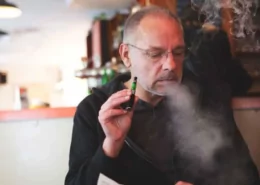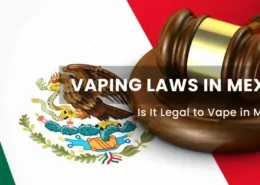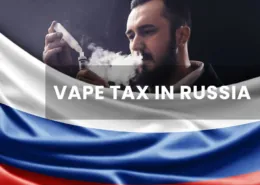Vaping Laws in Brazil – Is It Legal to Vape in Brazil?
Brazil, the largest country in South America, has taken a firm stance on the vaping issue, implementing some of the strictest laws and regulations concerning e-cigarettes and vaping devices. This article aims to provide a comprehensive overview of Brazil’s vaping landscape, exploring the current legal framework, recent developments, and the ongoing public health debate surrounding these products.
Current Legal Framework in Brazil
As of 2024, the commercialization of e-cigarettes remains illegal in Brazil, encompassing not only the sale but also the distribution and advertising of these products. The law aims to protect public health, given the potential risks associated with vaping, which has been linked to significant toxicity and is particularly attractive to younger populations.
- Sale Ban: Resolution No. 46 has banned the manufacture, import, sale, distribution, storage, transportation, and advertising of all vaping and heated tobacco products in Brazil since 2009.
- Use Restrictions: Law No. 9.294, which restricts smoking products, interprets the use of electronic smoking devices as prohibited in enclosed public places, workplaces, and public transport.
- Advertising Ban: The same resolution bans all forms of advertising and promotion of e-cigarettes, accessories, and refills.
ANVISA Reinforces the Ban in 2024
Despite the long-standing ban, the use of e-cigarettes has continued to grow in Brazil, with many consumers purchasing products through illegal channels or during trips abroad. This has led to ongoing debates about the effectiveness of the ban and the potential benefits of regulating the market instead.
On April 19, 2024, ANVISA voted unanimously to maintain the ban on vaping products following a public consultation that indicated significant opposition from some sectors of society. Despite this feedback, ANVISA justified its decision based on several key factors:
- Youth Vaping Trends: The growing concern about the rise in vaping among young people in countries where e-cigarettes are legal, with data from the Brazilian Institute of Geography and Statistics indicating that approximately 16.8% of students aged 13 to 17 have tried vaping at least once1.
- Health Risks: ANVISA highlighted the addictive nature of nicotine found in e-cigarettes and pointed out that many vapes can contain significantly higher levels of nicotine compared to traditional cigarettes, along with the lack of long-term studies on the health effects of vaping.
- Impact on Tobacco Control Policies: Brazil’s internationally recognized effective tobacco control measures could be undermined by allowing vaping products into the market.
- World Health Organization Recommendations: Citing a December 2023 publication from WHO, ANVISA reinforced its stance by stating that current evidence does not support allowing governments to permit the sale of electronic cigarettes.
Strengthened Regulations and Enforcement
Following the reaffirmation of the ban, ANVISA implemented stricter regulations regarding importation and distribution. These measures include:
- Prohibiting individuals from bringing vaping products into Brazil for personal use.
- Banning transportation and storage of these products, which could lead to broader interpretations affecting personal possession.
- Enforcing strict penalties against manufacturers and sellers who violate these regulations.
The resolution published on April 23, 2024, further prohibits any form of advertising or promotion related to vaping products and restricts their use in public spaces.
Brazilian authorities actively enforce the ban on the sale and importation of vaping products. ANVISA, in coordination with other government agencies, conducts regular inspections and raids to ensure compliance with the law. Individuals or businesses found violating these regulations may face severe penalties, including fines and legal action.
The Public Health Debate
The strict regulations surrounding vaping in Brazil have sparked a heated public health debate. Proponents of the ban argue that it is a necessary measure to protect public health, particularly that of young people who are most vulnerable to the marketing and appeal of these products. They point to the limited research on the long-term health effects of vaping and the potential for these devices to serve as a gateway to traditional tobacco use.
On the other hand, advocates for harm reduction strategies argue that e-cigarettes can serve as a less harmful alternative for adult smokers looking to quit or reduce their consumption of traditional cigarettes. They contend that a blanket ban may drive the vaping market underground, leading to the proliferation of unregulated and potentially more dangerous products.
Despite the ban, the use of e-cigarettes has been growing in Brazil, indicating a rise in black market activity. The lack of legal avenues for purchasing e-cigarettes has led to a situation where many consumers turn to unregulated sources, which poses additional health risks.
FAQs
Can I bring my vaping device to Brazil?
As of April 2024, ANVISA has approved a resolution prohibiting any kind of manufacturing, importing, selling, distribution, storage, transportation, or advertising of e-cigarettes in Brazil. This means that it is now prohibited to bring vaping devices into the country, even for personal use.
However, it is important to note that the enforcement of this rule may vary. Some travelers report bringing vapes into Brazil without any issues, particularly when placing them in carry-on luggage for safety reasons. In metropolitan areas, it is not uncommon to see people vaping outside of airport doors or in the streets. While the sale and importation of vaping products are illegal, the use of e-cigarettes is often not taken very seriously unless it involves major distribution.
Can I vape in Brazil?
Although the sale of vapes is prohibited in Brazil, it is very common to see people using them in the streets and open places. Additionally, it is not unusual to find vaping products being sold in small street stores, such as convenience stores, especially disposable e-cigarettes.
However, it is crucial to remember that vaping in Brazil remains illegal, and individuals caught using or selling these products may face legal consequences. It is always best to err on the side of caution and refrain from vaping in public spaces to avoid potential issues with law enforcement.
What are the penalties for violating Brazil’s vaping laws?
Individuals or businesses found violating Brazil’s vaping regulations may face severe penalties, including fines and legal action. The specific penalties for violating these laws may vary depending on the nature and severity of the offense.
According to Resolution RDC 855/2024, which strengthens the ban on vaping products, infractions can result in warnings, product seizure, destruction of seized products, suspension of sales and manufacturing activities, cancellation of company registration, and fines ranging from BRL 2,000 to BRL 1,500,000.
It is essential for both residents and visitors to understand and abide by Brazil’s vaping laws to avoid legal consequences and to prioritize their health and well-being.
Can I purchase vaping products online and have them shipped to Brazil?
No, it is illegal to purchase vaping products online and have them shipped to Brazil. The country’s ban on e-cigarettes and related products extends to all forms of importation, including online purchases from international retailers.
Attempting to import vaping products into Brazil may result in the seizure of the items by customs authorities and potential legal consequences for the individual making the purchase. It is crucial to respect Brazil’s vaping laws and refrain from attempting to circumvent the ban through online purchases.
Are there any exceptions to Brazil’s vaping ban?
Currently, there are no exceptions to Brazil’s ban on vaping products. The prohibition applies to all forms of e-cigarettes, heated tobacco products, and related accessories, regardless of the nicotine content or intended use.
Some advocates for harm reduction strategies have argued for the regulation of vaping products as a less harmful alternative for adult smokers looking to quit traditional cigarettes. However, as of 2024, ANVISA and the Brazilian government have maintained their stance that the potential risks of vaping outweigh any potential benefits, and the ban remains in place without exceptions.
As the public health debate surrounding vaping continues to evolve, it is possible that Brazil’s laws and regulations may adapt in the future. However, for the time being, it is essential to understand and comply with the country’s strict prohibition on all forms of vaping products.
Legislative Developments and Future Outlook
While ANVISA maintains a firm stance against vaping products, there are ongoing debates within Brazil’s legislative framework regarding potential legalization under regulated conditions. A bill currently being discussed in the Senate aims to authorize the production, importation, exportation, and consumption of e-cigarettes; however, it remains in the early stages without a scheduled voting date2.
The future of vaping in Brazil remains uncertain, with public health considerations at the forefront of the debate. As more research emerges on the health effects of e-cigarettes and the effectiveness of harm reduction strategies, policymakers will need to carefully weigh the potential benefits and risks of these products.
For now, Brazil’s approach to vaping serves as an example of a country prioritizing the well-being of its citizens over the pressures of a growing global industry. As the vaping landscape continues to evolve, both in Brazil and worldwide, it is crucial for individuals to stay informed about the laws and regulations in their respective countries and to make informed decisions about their health.
- PeNSE – Pesquisa Nacional de Saúde do Escolar: https://www.ibge.gov.br/estatisticas/sociais/saude/9134-pesquisa-nacional-de-saude-do-escolar.html ↩︎
- Request No. 2355, 2021: https://www25.senado.leg.br/web/atividade/materias/-/materia/151156 ↩︎
- Austria Plans to Ban Disposable E-Cigarettes - August 5, 2025
- Vaping vs. THC Drinks: Which Cannabis Option Is Right for You? - August 4, 2025
- Colombia’s New Vape Law: A Reality Check on Enforcement - August 4, 2025

